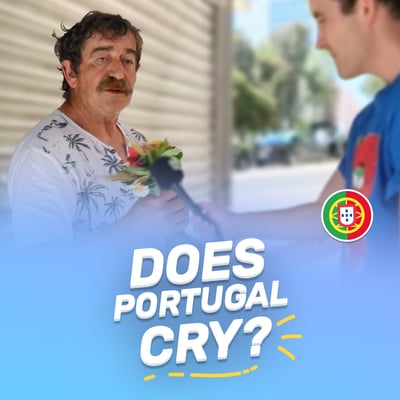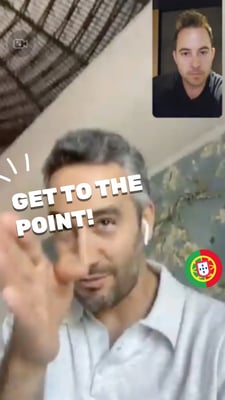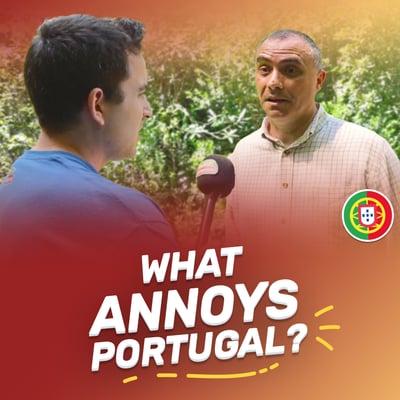1
00:00:29,333 –> 00:00:30,958
Joel: Estamos a caminho para…
{{Joel: We’re on our way to…}}
2
00:00:30,958 –> 00:00:31,792
Rui: Porto.
{{Rui: Porto.}}
3
00:00:31,792 –> 00:00:32,292
J: Porto.
{{J: Porto.}}
4
00:00:32,333 –> 00:00:39,875
R: Sim. Apanhámos o comboio perto de casa e saímos na estação do Oriente
{{R: Yes. We caught the train close to home and we got out in the Oriente station}}
5
00:00:39,917 –> 00:00:43,042
e trocámos de comboio para o Porto.
{{and we switched to the train to Porto.}}
6
00:00:43,042 –> 00:00:48,042
J: Sim, e quando chegarmos, vamos caminhar um pouco até…
{{J: Yes, and when we get there, we’re going to walk a bit to…}}
7
00:00:48,042 –> 00:00:49,000
R: Vamos partir…
{{R: We’re going to depart…}}
8
00:00:49,042 –> 00:00:51,500
J: …O início do caminho, não é?
{{J: … The start of the route, right?}}
9
00:00:51,500 –> 00:00:55,500
R: Sim. Eu não sei, o Joel é que está a planear tudo.
{{R: Yes. I don’t know, Joel is the one planning everything.}}
10
00:00:55,500 –> 00:00:56,333
J: Uh-oh.
{{J: Uh-oh.}}
11
00:01:01,917 –> 00:01:06,250
J: Dois bilhetes para Porto-Campanhã. Este número, se faz favor.
{{J: Two tickets to Porto-Campanhã. This number, please.}}
12
00:01:06,250 –> 00:01:08,125
R: Fatura com contribuinte.
{{R: Receipt with tax number.}}
13
00:01:08,875 –> 00:01:12,250
J: É uma despesa de negócio. Obrigado.
{{J: It’s a business expense. Thank you.}}
14
00:01:12,292 –> 00:01:13,667
R: Podemos ver?
{{R: Can we take a look?}}
15
00:01:15,375 –> 00:01:18,208
Baaam… Trinta e trinta.
{{Baaam… Thirty thirty.}}
16
00:01:18,208 –> 00:01:19,292
J: Vamos ver como corre.
{{J: Let’s see how it goes.}}
17
00:01:19,333 –> 00:01:22,917
R: (O Joel) tratou de tudo, mas eu acho que ele nem sabe onde é que nós vamos começar.
{{R: (Joel) took care of everything, but I think he doesn’t even know where we’re starting.}}
18
00:01:22,917 –> 00:01:24,708
J: É um caminho. Toda a gente…
{{J: It’s a route. Everybody…}}
19
00:01:24,750 –> 00:01:25,375
R: Mas não faz mal.
{{R: But it’s all right.}}
20
00:01:25,417 –> 00:01:26,667
J: Ninguém planeia nada.
{{J: No one plans anything.}}
21
00:01:26,708 –> 00:01:31,500
R: Para mim é melhor, porque estou mais relaxado. Não tenho expectativas, portanto,
{{R: It’s better for me, because I’m more relaxed. I have no expectations, so}}
22
00:01:31,542 –> 00:01:34,000
tudo o que acontecer, acho que vai ser bom.
{{whatever happens, I think it’s going to be good.}}
23
00:01:34,042 –> 00:01:37,250
J: E tens algumas preocupações da viagem em geral?
{{J: And do you have any concerns about the trip in general?}}
24
00:01:37,250 –> 00:01:41,958
R: Não. Caminhar. É só seguir as setas.
{{R: No. Just walking. Just following the arrows.}}
25
00:01:42,792 –> 00:01:46,833
J: Estou um pouco nervoso sobre a situação de dormir.
{{J: I’m a bit nervous about the sleeping situation.}}
26
00:01:46,833 –> 00:01:47,542
R: Alojamento.
{{R: Accommodation.}}
27
00:01:47,542 –> 00:01:48,167
J: Alojamento.
{{J: Accommodation.}}
28
00:01:48,208 –> 00:01:49,125
R: Alojamento.
{{R: Accommodation.}}
29
00:01:50,583 –> 00:01:58,167
O nosso plano é caminhar até ao ponto de destino e decidir nessa altura onde é que ficamos.
{{Our plan is to walk to our destination and then figure out where to stay.}}
30
00:01:58,208 –> 00:02:01,333
Se ficamos num albergue, se ficamos numa pensão, num hotel…
{{Whether we stay in a guesthouse, a pension, a hotel…}}
31
00:02:01,333 –> 00:02:05,167
J: Bem, para esta primeira noite, já temos um albergue marcado.
{{J: Well, for this first night, we already booked a guesthouse.}}
32
00:02:05,333 –> 00:02:07,375
R: Mas é um albergue privado, não é?
{{R: But it’s a private guesthouse, isn’t it?}}
33
00:02:07,375 –> 00:02:08,375
J: É, sim, sim.
{{J: Yes, yes it is.}}
34
00:02:08,417 –> 00:02:10,542
R: Porque a maioria não permite…
{{R: Because most of them don’t allow…}}
35
00:02:10,542 –> 00:02:11,667
J: Marcações.
{{J: Reservations.}}
36
00:02:11,667 –> 00:02:16,292
Este permite… Sim, é melhor, porque é o primeiro dia,
{{This one does… Yes, it’s better, because it’s the first day, }}
37
00:02:16,333 –> 00:02:21,542
não sabemos a que horas vamos chegar, porque estamos a ir de comboio até ao Porto
{{we don’t know what time we’ll get there, because we’re going by train to Porto}}
38
00:02:21,542 –> 00:02:26,167
e depois vamos começar a caminhar no mesmo dia.
{{and then we’re going to start walking on the same day.}}
39
00:02:26,208 –> 00:02:28,542
Portanto, vamos chegar mais tarde que o normal.
{{So, we’re going to arrive later than usual.}}
40
00:02:28,583 –> 00:02:33,708
J: E não estamos a viajar sozinhos, estamos a viajar com três amigos.
{{J: And we’re not traveling alone, we’re traveling with three friends.}}
41
00:02:33,750 –> 00:02:40,167
R: O Rafa, o Lance e o Pedro. Estamos no comboio, temos os nossos snacks…
{{R: Rafa, Lance and Pedro. We’re on the train, we have our snacks…}}
42
00:02:40,542 –> 00:02:42,958
J: É só esperar mais duas horas e tal.
{{J: We just have to wait another two hours or so.}}
43
00:02:43,000 –> 00:02:45,667
R: Temos os gadgets do Joel…
{{R: We have Joel’s gadgets…}}
44
00:02:45,667 –> 00:02:49,208
J: Ah, isso é para o microfone, para não apanhar vento no microfone.
{{J: Ah, that’s for the microphone, so it doesn’t pick up wind.}}
45
00:02:49,250 –> 00:02:50,958
R: O Joel trouxe um teclado…
{{R: Joel brought a keyboard…}}
46
00:02:51,458 –> 00:02:54,625
J: Para responder aos membros todos os dias, ou quase.
{{J: To reply to members every day, or almost.}}
47
00:02:54,667 –> 00:02:56,583
R: Sim, para estarmos em contacto.
{{R: Yes, for us to be in touch.}}
48
00:02:56,583 –> 00:03:03,750
E pronto, esperamos que vocês gostem da nossa videorreportagem.
{{And that’s it, we hope you like our video report.}}
49
00:03:18,708 –> 00:03:20,708
J: Olha, Rui, já começámos, não é?
{{J: Look, Rui, we’ve already started, haven’t we?}}
50
00:03:20,708 –> 00:03:22,833
R: Sim. Vai ser bom.
{{R: Yes. It’s going to be good.}}
51
00:03:22,875 –> 00:03:25,250
J: E agora, vamos para onde?
{{J: And now, where are we going?}}
52
00:03:25,292 –> 00:03:28,042
R: Para o Largo… da Sé?
{{R: To the square… of the Sé [cathedral]?}}
53
00:03:28,042 –> 00:03:30,542
J: Praça de Alberto… Something something.
{{J: Alberto… Something something square.}}
54
00:03:30,625 –> 00:03:34,875
R: Praça… Alberto something something, à procura da nossa primeira concha!
{{R: Alberto… Something something square, looking for our first shell!}}
55
00:03:35,500 –> 00:03:37,125
Lance: Boa tarde.
{{Lance: Good afternoon.}}
56
00:03:37,917 –> 00:03:41,125
Pedro: Vou ensinar todo o calão português!
{{Pedro: I’m going to teach you all the Portuguese slang!}}
57
00:03:41,167 –> 00:03:41,750
J: OK!
{{J: OK!}}
58
00:03:42,542 –> 00:03:43,583
P: As asneiras…
{{P: Swear words…}}
59
00:03:43,625 –> 00:03:45,042
J: Então, a primeira asneira.
{{J: So, the first swear word.}}
60
00:03:45,417 –> 00:03:46,000
P: Mer…
{{P: Sh…}}
61
00:04:18,917 –> 00:04:21,542
R: A pronúncia do Porto é diferente da pronúncia de Lisboa?
{{R: Is Porto’s pronunciation different from Lisbon’s?}}
62
00:04:21,542 –> 00:04:23,750
Senhora: Então não é? A da do Porto é melhor.
{{Lady: Well, is it not? Porto’s is better.}}
63
00:04:23,833 –> 00:04:24,792
R: É melhor?
{{R: Is it better?}}
64
00:04:24,792 –> 00:04:28,208
Sra: Claro. A nossa pronúncia é melhor!
{{Lady: Of course. Our pronunciation is better!}}
65
00:04:28,250 –> 00:04:31,500
R: Olhe, e diga lá, é verdade que aqui diz-se muitas asneiras?
{{R: Look, tell me something, is it true that people swear a lot in here?}}
66
00:04:34,667 –> 00:04:35,958
Sra: Quando é preciso.
{{Lady: When it’s necessary.}}
67
00:04:36,958 –> 00:04:38,208
R: Mas é verdade, não é?
{{R: But it’s true, isn’t it?}}
68
00:04:38,250 –> 00:04:39,708
Sra: É, quando é preciso.
{{Lady: Yes, when it’s necessary.}}
69
00:04:39,708 –> 00:04:40,750
R: Diz-se assim umas…
{{R: People say a few…}}
70
00:04:40,750 –> 00:04:41,917
Sra: Quer que eu diga?
{{Lady: Do you want me to say (one)?}}
71
00:04:41,917 –> 00:04:43,667
R: Diga lá assim uma coisa… O que é que se diz assim…
{{R: Say, like, something… What do you say…}}
72
00:04:43,708 –> 00:04:47,083
Sra: Quando é preciso mandá-los foder, mandamos, os lisboetas se foder.
{{Lady: When we have to tell them to **** off, we do. We tell Lisboners to **** off.}}
73
00:04:47,125 –> 00:04:48,417
R: É, não é? Vão-se foder.
{{R: Right? **** off.}}
74
00:04:48,417 –> 00:04:49,042
Sra: Pois.
{{Lady: Right.}}
75
00:04:49,042 –> 00:04:50,042
R: Aqui é mais normal, não é?
{{R: It’s more common here, isn’t it?}}
76
00:04:50,083 –> 00:04:50,875
Sra: É.
{{Lady: It is.}}
77
00:04:50,917 –> 00:04:53,083
R: Ou assim umas caralhadas, também de vez em quando…
{{R: Or a few ****’s as well, every once in a while…}}
78
00:04:53,083 –> 00:04:54,250
Sra: É claro.
{{Lady: Of course.}}
79
00:04:54,542 –> 00:04:56,042
R: E o que é que a senhora está a fazer?
{{R: And what are you doing?}}
80
00:04:56,083 –> 00:04:58,292
Sra: Eu estou a rematar uma passadeira.
{{Lady: I’m weaving in the ends of a runner.}}
81
00:04:58,292 –> 00:04:59,417
R: É a senhora que as faz?
{{R: Are you the one who makes them?}}
82
00:04:59,458 –> 00:05:00,208
Sra: Não.
{{Lady: No.}}
83
00:05:00,458 –> 00:05:01,500
R: Ah, é sua?
{{R: Ah, it’s just yours?}}
84
00:05:01,542 –> 00:05:05,708
Sra: É minha. Isto estava a desfazer e eu estou a ajeitá-la.
{{Lady: It’s mine. It was coming undone and I’m fixing it up.}}
85
00:05:05,792 –> 00:05:08,417
R: Sabe onde é que nós vamos? Fazer o caminho de Santiago.
{{R: Do you know where we’re going? To do the Caminho of Santiago}}
86
00:05:08,417 –> 00:05:09,542
Sra: É?
{{Lady: Is that so?}}
87
00:05:09,542 –> 00:05:11,208
R: Parte muita gente daqui, não é?
{{R: Many people depart from here, right?}}
88
00:05:11,208 –> 00:05:12,333
Sra: É.
{{Lady: Yes.}}
89
00:05:12,833 –> 00:05:15,583
R: E alguns deles nunca tinham visto o Porto, então dizem…
{{R: And some of them had never seen Porto, so they say…}}
90
00:05:15,583 –> 00:05:18,333
Sra: Claro, e temos aqui a Sé, que é… é muito bonita.
{{Lady: Sure, and we’ve got the Sé over here, which is… it’s very beautiful.}}
91
00:05:18,333 –> 00:05:19,292
R: É bonita, não é?
{{R: It’s beautiful, isn’t it?}}
92
00:05:19,333 –> 00:05:23,167
Sra: Mais bonita que a de Lisboa. E no Porto não somos mais coisas do que Lisboa?
{{Lady: More beautiful than Lisbon’s Sé. And in Porto, aren’t we more than Lisbon?}}
93
00:05:23,208 –> 00:05:24,708
R: São genuínos, isso são.
{{R: You’re genuine, that’s for sure.}}
94
00:05:24,708 –> 00:05:25,792
Sra: Isso é.
{{Lady: Right.}}
95
00:05:25,833 –> 00:05:26,292
R: Isso é verdade.
{{R: That’s true.}}
96
00:05:26,333 –> 00:05:28,792
Sra: E o que se tem a dizer logo, diz-se logo na cara das pessoas.
{{Lady: And whatever we have to say, we say it right to people’s faces.}}
97
00:05:28,833 –> 00:05:29,458
R: Diz-se logo, logo.
{{R: You say it right away.}}
98
00:05:29,458 –> 00:05:30,958
Sra: Não se manda dizer por ninguém.
{{Lady: You don’t tell anyone to say it for you.}}
99
00:05:31,167 –> 00:05:33,417
R: E também as pessoas dão-se mais umas com as outras, não é?
{{R: And people also get along more with each other, right?}}
100
00:05:33,417 –> 00:05:37,208
Sra: Claro. E a gente indica às pessoas o que é…
{{Lady: Of course. And we explain people what…}}
101
00:05:37,208 –> 00:05:42,208
O caminho, vens assim a perguntar onde é que fica isto ou aquilo, a gente explica.
{{The way, if you come up and ask where’s this or that, we explain it to you.}}
102
00:05:42,250 –> 00:05:43,958
R: Sim. Não são tão desconfiados, pois não?
{{R: Yes. You’re not as suspicious (as a people), are you?}}
103
00:05:44,000 –> 00:05:47,375
Sra: Não. Os desconfiados não são certos.
{{Lady: No. The suspicious people aren’t right.}}
104
00:05:48,292 –> 00:05:51,667
R: Ouviste? Ele já fala bem para um canadiano, hã?
{{R: Did you hear that? He already speaks well for a Canadian, huh?}}
105
00:05:51,667 –> 00:05:52,292
Sra: Ah é?
{{Lady: Ah, does he?}}
106
00:05:52,292 –> 00:05:53,250
J: Mais ou menos.
{{J: Sort of.}}
107
00:05:53,708 –> 00:05:58,167
Sra: Ah, ele vai já aprender a falar bem português. A língua portuguesa é mais linda.
{{Lady: Ah, he’s going to learn Portuguese well. The Portuguese language is the most beautiful.}}
108
00:05:58,167 –> 00:06:00,000
J: É linda. É muito linda.
{{J: It’s beautiful. It’s very beautiful.}}
109
00:06:00,208 –> 00:06:02,083
Sra: E aqui a nossa Sé também é linda.
{{Lady: And our Sé is also beautiful.}}
110
00:06:02,083 –> 00:06:03,708
R: Como é que a senhora se chama?
{{R: What’s your name?}}
111
00:06:03,708 –> 00:06:04,500
Sra: Eu? Cila.
{{Lady: Me? Cila.}}
112
00:06:04,500 –> 00:06:07,500
R: Cila. Pronto, Cila, vou lhe dar um grande beijinho. Obrigado.
{{R: Cila. All right, Cila, I’m going to give you a big kiss. Thank you.}}
113
00:06:07,542 –> 00:06:08,250
Sra: ‘Tá, filho.
{{Lady: All right, son.}}
114
00:06:08,833 –> 00:06:10,375
R: Muito boa… Muita sorte.
{{R: Best… Best of luck.}}
115
00:06:10,375 –> 00:06:11,958
Sra: ‘Tá, igualmente. Tudo de bom.
{{Lady: OK, same for you. All the best.}}
116
00:06:11,958 –> 00:06:12,708
R: Adeus. Obrigado.
{{R: Goodbye. Thank you.}}
117
00:06:12,708 –> 00:06:13,417
Sra: Felicidades.
{{Lady: Best wishes.}}
118
00:06:13,417 –> 00:06:14,167
R: Adeus.
{{R: Bye.}}
119
00:06:36,292 –> 00:06:42,458
R: Acabámos de conseguir o nosso primeiro selo, na Catedral, na Sé da Catedral do Porto.
{{R: We just got our first stamp, at the Cathedral, the Sé of Porto.}}
120
00:06:42,833 –> 00:06:46,750
É oficial, vai começar agora. Esta é a primeira seta.
{{It’s official, it’s starting right now. This is the first arrow.}}
121
00:06:46,750 –> 00:06:48,208
P: Let’s do Fátima, instead.
{{P: Let’s do Fátima, instead.}}
122
00:06:48,792 –> 00:06:53,333
R: Sim, podemos ir para Santiago ou podemos ir para Fátima e seguir as setas azuis.
{{R: Yes, we can go to Santiago or we can go to Fátima and follow the blue arrows.}}
123
00:06:53,333 –> 00:06:55,208
Mas nós vamos para Santiago.
{{But we’re headed to Santiago.}}
124
00:07:07,083 –> 00:07:09,250
J: Pedro, como está a correr?
{{P: Pedro, how’s it going?}}
125
00:07:09,250 –> 00:07:10,708
P: Está a correr bem.
{{P: It’s going well.}}
126
00:07:10,750 –> 00:07:11,875
J: Estás cansado?
{{J: Are you tired?}}
127
00:07:11,917 –> 00:07:13,792
P: Ainda não, mas estou com fome.
{{P: Not yet, but I’m hungry.}}
128
00:07:13,792 –> 00:07:17,000
J: Ah! Daqui a quatro horas vamos comer, está bem?
{{J: Ah! We’ll eat in four hours, OK?}}
129
00:07:17,000 –> 00:07:17,583
P: Não.
{{P: No.}}
130
00:07:17,583 –> 00:07:18,333
J: Não?
{{J: No?}}
131
00:07:18,333 –> 00:07:19,292
P: Não.
{{P: No.}}
132
00:07:56,875 –> 00:08:01,667
R: Força! Força, peregrinos! Força, força!
{{R: Go! Go, pilgrims! Go, go!}}
133
00:08:04,125 –> 00:08:09,583
São oito horas. Acho que chegámos ao Porto à uma, certo?
{{It’s 8pm. I think we arrived in Porto at 1pm, right?}}
134
00:08:09,583 –> 00:08:10,375
J: Certo.
{{J: Right.}}
135
00:08:10,375 –> 00:08:13,250
R: Então estamos a caminhar há sete.
{{R: So we’ve been walking for seven hours.}}
136
00:08:13,250 –> 00:08:17,292
Já trocamos… Eu e o Joel já trocamos para as sandálias.
{{We already switched… Joel and I already switched to sandals.}}
137
00:08:18,250 –> 00:08:24,458
Nós estávamos com muito calor. O nosso amigo Rafa já arranjou um cajado de madeira.
{{We were feeling very hot. Our friend Rafa already got a wooden staff.}}
138
00:08:24,458 –> 00:08:29,708
Um verdadeiro cajado, não aqueles bastões de plástico.
{{A real staff, not those plastic walking sticks.}}
139
00:08:29,708 –> 00:08:31,167
J: Como um ‘pelegrino’ de verdade.
{{J: Like a real ‘pelegrino’.}}
140
00:08:31,167 –> 00:08:36,958
R: Sim, como um peregrino de verdade. O Joel gosta de dizer ‘pelegrino’.
{{R: Yes, like a real ‘peregrino’ [pilgrim]. Joel likes to say ‘pelegrino’.}}
141
00:08:36,958 –> 00:08:37,833
J: Peregrino.
{{J: Peregrino.}}
142
00:08:37,833 –> 00:08:38,917
R: Peregrino.
{{R: Peregrino.}}
143
00:08:39,208 –> 00:08:44,458
Os nossos outros dois amigos vão ali à frente, o Lance e o Pedro.
{{Our two other friends are further ahead, Lance and Pedro.}}
144
00:08:45,708 –> 00:08:52,625
Já parámos num café que tinha o famoso menu do peregrino, onde comprámos as águas.
{{We already stopped by a café which had the famous pilgrim’s menu, where we bought water.}}
145
00:08:52,625 –> 00:09:00,667
E conseguimos mais um selo na nossa caderneta, no nosso passaporte do peregrino.
{{And we got another stamp on our booklet, our pilgrim’s passport.}}
146
00:09:03,083 –> 00:09:06,167
Já vimos, já falámos com muitas pessoas.
{{We’ve already seen, already talked with lots of people.}}
147
00:09:06,167 –> 00:09:09,583
Olá! Eu e este menino, que é do Canadá,
{{Hi! Me and this guy, who’s from Canada,}}
148
00:09:09,583 –> 00:09:15,125
temos um projeto para ensinar portugues aos estrangeiros que querem falar português.
{{we have a project to teach Portuguese to foreigners who want to speak Portuguese.}}
149
00:09:15,125 –> 00:09:17,083
A senhora acha difícil o português?
{{Do you find Portuguese difficult?}}
150
00:09:17,083 –> 00:09:19,375
Sra: Eu não sei, eu nunca fui para uma escola, sabe?
{{Lady: I don’t know, I never went to school, you know?}}
151
00:09:19,375 –> 00:09:20,542
R: Ah, mas fala bem.
{{R: Ah, but you speak well.}}
152
00:09:20,542 –> 00:09:23,875
Sra: Pois. Passam aqui muitos que não percebem.
{{Lady: Right. Many people who pass by here don’t understand.}}
153
00:09:23,875 –> 00:09:24,625
R: Sim.
{{R: Yes.}}
154
00:09:24,625 –> 00:09:28,542
Sra: E eu… E eu digo assim, “O Senhor vos acompanhe.”
{{Lady: And I… And I tell them, “May the Lord be with you.”}}
155
00:09:28,542 –> 00:09:29,542
R: E eles percebem isso.
{{R: And they understand that.}}
156
00:09:29,542 –> 00:09:30,250
Sra: E eles percebem logo.
{{Lady: And they understand it immediately.}}
157
00:09:30,250 –> 00:09:33,542
R: Essa linguagem é universal, a mensagem é sempre a mesma.
{{R: That language is universal, the message is always the same.}}
158
00:09:33,542 –> 00:09:35,125
Sra: Eles percebem logo.
{{Lady: They understand it right away.}}
159
00:09:35,125 –> 00:09:39,458
R: E a senhora consegue levar isto tudo sozinha? Que idade tem, se não é indiscrição?
{{R: And you can carry all of this by yourself? How old are you, if you don’t mind me asking?}}
160
00:09:40,292 –> 00:09:41,750
Sra: Oitenta e três.
{{Lady: 83.}}
161
00:09:41,750 –> 00:09:46,750
R: Fogo… A minha avó tem oitenta e um e… coitadinha.
{{R: Wow… My grandmother is 81 and… poor thing.}}
162
00:09:46,750 –> 00:09:50,167
Adoro a minha avó, mas eu acho que ela não conseguia levar isso.
{{I love my grandma, but I don’t think she could carry that.}}
163
00:09:50,167 –> 00:09:53,958
Sra: E ando aí de… enquanto uma pessoa puder.
{{Lady: And I walk around… For as long as possible.}}
164
00:09:53,958 –> 00:09:55,500
R: Sem parar, hã?
{{R: Non-stop, huh?}}
165
00:09:56,333 –> 00:10:01,542
Oitenta e três. E nós queixamo-nos porque doem os pés.
{{83. And we complain that our feet hurt.}}
166
00:10:02,417 –> 00:10:05,000
E esta senhora vai com…
{{And this lady is wearing…}}
167
00:10:05,000 –> 00:10:09,917
Galochas. É o que nós chamamos em português àquelas botas.
{{‘Galochas’. That’s what we call those boots in Portuguese.}}
168
00:10:09,917 –> 00:10:10,625
J: Vocês –
{{J: Do you –}}
169
00:10:10,625 –> 00:10:11,458
R: Galoshes?
{{R: Galoshes?}}
170
00:10:11,458 –> 00:10:12,250
J: Acho que usamos essa palavra, sim.
{{J: I think we use that word, yes.}}
171
00:10:12,250 –> 00:10:15,167
R: Olha, que engraçado. E aquilo é um carrinho de mão.
{{R: Oh, how interesting. And that’s a ‘carrinho de mão’ [wheelbarrow].}}
172
00:10:15,167 –> 00:10:19,958
Chama-se carrinho de mão, onde se carrega muita coisa. É usado também na construção,
{{It’s called ‘carrinho de mão’, where you carry lots of things. It’s also used in construction,}}
173
00:10:19,958 –> 00:10:22,708
para se levar o cimento e a areia… Enfim.
{{to carry cement and sand… Anyway…}}
174
00:10:22,708 –> 00:10:24,667
Estamos a chegar a…
{{We’re about to arrive in…}}
175
00:10:25,208 –> 00:10:26,500
O nosso destino é…
{{Our destination is…}}
176
00:10:26,500 –> 00:10:29,792
Já estamos, em Vila do Conde. Já estamos em Vila do Conde, ou não?
{{We’re here already, in Vila do Conde. Are we already in Vila do Conde or not?}}
177
00:10:29,792 –> 00:10:30,708
Sra: Estamos, estamos.
{{Lady: We are, we are.}}
178
00:10:30,708 –> 00:10:31,917
R: No distrito, não é?
{{R: In the district, right?}}
179
00:10:31,917 –> 00:10:32,750
Sra: É sim.
{{Lady: That’s right.}}
180
00:10:32,750 –> 00:10:35,042
R: E que vila… Que aldeia é esta, ou vila?
{{R: And which town… Which village or town is this?}}
181
00:10:35,542 –> 00:10:36,542
Sra: Mosteiró.
{{Lady: Mosteiró.}}
182
00:10:36,542 –> 00:10:37,500
R: Mosteiró.
{{R: Mosteiró.}}
183
00:10:38,000 –> 00:10:39,333
Sra: E é… Ide com Deus.
{{Lady: And it’s… May God be with you.}}
184
00:10:39,333 –> 00:10:42,167
R: Aqui vem o Rafa. Obrigado, adeus! Não quer ajuda?
{{R: Here comes Rafa. Thank you, goodbye! Don’t you want help?}}
185
00:10:42,167 –> 00:10:44,417
Sra: Obrigada, obrigada. Ide com Deus, ide com Deus.
{{Lady: Thank you, thank you. May God be with you.}}
186
00:10:44,417 –> 00:10:45,625
R: Adeus, obrigado.
{{R: Goodbye, thank you.}}
187
00:10:45,625 –> 00:10:49,000
E mais… Acho que ainda temos uma hora de caminho.
{{What else… I think we still have an hour of walking left.}}
188
00:10:49,583 –> 00:10:54,458
Hoje é um dia diferente, porque hoje decidimos fazer tudo de uma vez só. Certo?
{{Today’s a different day, because we decided to do it all in one go. Right?}}
189
00:10:54,458 –> 00:10:55,250
J: Certo.
{{J: Right.}}
190
00:10:55,250 –> 00:10:58,917
R: Apanhámos o comboio de Lisboa e decidimos começar a caminhar hoje mesmo.
{{R: We got the train in Lisbon and we decided to start walking today.}}
191
00:10:58,917 –> 00:11:01,333
Acho que vamos chegar já de noite, não é?
{{I think we’re going to arrive when it’s already night, right?}}
192
00:11:01,333 –> 00:11:03,833
J: Sim, por volta das oito ou nove da tarde.
{{J: Yes, around 8 or 9 in the afternoon.}}
193
00:11:03,833 –> 00:11:08,000
R: Já são oito. Portanto, se calhar, nove da noite. Nove da noite.
{{R: It’s already 8pm. So, maybe, 9 in the evening. 9 in the evening.}}
194
00:11:08,000 –> 00:11:09,167
J: Nove da noite.
{{J: 9 in the evening.}}
195
00:11:09,167 –> 00:11:11,875
R: Sim. Engraçado, oito da tarde, nove da noite.
{{R: Yes. Interesting, 8 in the afternoon, 9 in the evening.}}
196
00:11:11,875 –> 00:11:15,542
Acho que nove faz ali a transição para a noite.
{{I think it’s at 9pm that we transition into the evening.}}
197
00:11:16,125 –> 00:11:21,875
Mas decidimos que hoje, por chegarmos tão tarde, era melhor reservar já…
{{But we decided that today, for arriving so late, it was best to already reserve…}}
198
00:11:21,875 –> 00:11:25,333
Um… É um albergue, mas é privado, certo?
{{A… It’s a guesthouse, but it’s private, right?}}
199
00:11:25,333 –> 00:11:27,250
Foi o Joel que tratou disso.
{{It was Joel that took care of that.}}
200
00:11:27,542 –> 00:11:29,875
Joel no comando!
{{Joel in charge!}}
201
00:11:30,833 –> 00:11:33,708
E o que é que achas das sandálias, o que é que tu dizes?
{{And what do you think of the sandals, what do you say?}}
202
00:11:33,708 –> 00:11:35,042
J: Até agora…
{{J: So far…}}
203
00:11:35,042 –> 00:11:35,625
R: Gostas?
{{R: Do you like them?}}
204
00:11:35,625 –> 00:11:36,417
J: Acho que sim.
{{J: I think so.}}
205
00:11:36,417 –> 00:11:39,292
R: Sim. Os pés estavam a ficar muito quentes nos ténis.
{{R: Yes. Our feet were getting too hot in the sneakers.}}
206
00:11:39,292 –> 00:11:40,375
J: São mais frescos.
{{J: These are cooler.}}
207
00:11:40,375 –> 00:11:44,083
R: Sim. E o importante, para alguém que queira fazer o caminho,
{{R: Yes. And it’s important, for someone who wants to walk the Caminho,}}
208
00:11:44,125 –> 00:11:47,292
lembrem-se, os pés devem estar secos, porque é…
{{is that the feet should be dry, because it’s…}}
209
00:11:47,292 –> 00:11:49,042
J: Vou ser atropelado!
{{J: I’m going to get run over!}}
210
00:11:53,042 –> 00:11:55,375
R: Acho que isto foi um aviso.
{{R: I think this was a warning.}}
211
00:11:56,083 –> 00:11:57,667
Cuidado!
{{Careful!}}
212
00:11:59,083 –> 00:12:04,917
Portanto, de vez em quando, é importante parar, tirar as meias, deixar os pés secar,
{{So, every once in a while, it’s important to stop, take off your socks, let your feet dry,}}
213
00:12:04,917 –> 00:12:06,875
ou então usar sandálias.
{{or wear sandals.}}
214
00:12:07,208 –> 00:12:12,833
Assim eles não ficam húmidos, porque é a humidade, com o calor, que depois cria as bolhas.
{{That way, they don’t get humid, because it’s moisture, along with the heat, that causes blisters.}}
215
00:12:12,833 –> 00:12:19,833
Engraçado. Estas amoras ainda não estão maduras, porque senão, podíamos encher a barriga.
{{Interesting. These blackberries aren’t ripe yet, otherwise, we could stuff ourselves.}}
216
00:12:30,292 –> 00:12:31,292
J: Boa tarde.
{{J: Good afternoon.}}
217
00:12:31,292 –> 00:12:32,875
Sra: Boa tarde, boa viagem.
{{Lady: Good afternoon, have a good trip.}}
218
00:12:32,875 –> 00:12:33,792
J: Obrigado.
{{J: Thank you.}}
219
00:13:00,167 –> 00:13:03,875
R: Já comemos amoras, já roubamos uma pera…
{{R: We already ate blackberries, we already stole a pear…}}
220
00:13:03,875 –> 00:13:08,750
Também tentámos roubar uma maçã, mas íamos morrendo envenenados, estava verde.
{{We also tried to steal an apple, but we almost died of poisoning, it was green.}}
221
00:13:09,667 –> 00:13:12,917
Na verdade, nós estamos a ir pelo caminho perigoso.
{{Actually, we’re taking the dangerous route.}}
222
00:13:12,917 –> 00:13:17,000
Havia um desvio lá atrás que nos mandava ir para a direita
{{There was a detour back there that sent us to the right}}
223
00:13:17,000 –> 00:13:22,208
e avisava que este era o caminho perigoso. Nós supomos… Cuidado, mais carros.
{{and warned that this was the dangerous path. We assume… Careful, more cars.}}
224
00:13:25,000 –> 00:13:31,333
Nós supomos que o desvio seja por causa desta estrada, onde não há espaço para caminhar.
{{We assume that the detour is because of this road, where there’s no room to walk.}}
225
00:13:31,333 –> 00:13:35,958
É impossível caminhar aqui sem ser no meio da estrada e claro que isso é perigoso.
{{It’s impossible to walk anywhere other than the middle of the road, and of course that’s dangerous.}}
226
00:13:35,958 –> 00:13:40,208
Mas como o nosso albergue fica em linha reta
{{But since our guesthouse is in a straight line from here}}
227
00:13:40,208 –> 00:13:45,417
e não queríamos fazer um desvio de mais meia hora, decidimos vir por aqui.
{{and we didn’t want to do a detour of another half hour, we decided to come this way.}}
228
00:13:45,417 –> 00:13:50,667
Somos ousados, ‘daredevils’.
{{We’re bold, daredevils.}}
229
00:14:03,000 –> 00:14:04,500
J: Olá!
{{J: Hi!}}
230
00:14:11,417 –> 00:14:12,208
Olá!
{{Hi!}}
231
00:14:12,208 –> 00:14:13,083
Senhor: Ah, olá!
{{Sir: Ah, hi!}}
232
00:14:13,083 –> 00:14:13,875
J: Eu sou o Joel.
{{J: I’m Joel.}}
233
00:14:14,208 –> 00:14:14,708
R: Boa tarde.
{{R: Good afternoon.}}
234
00:14:14,708 –> 00:14:15,792
J: Muito prazer.
{{J: It’s a pleasure to meet you.}}
235
00:14:15,792 –> 00:14:17,792
R: Eu sou o Rui. Sou de Lisboa.
{{R: I’m Rui. I’m from Lisbon.}}
236
00:14:17,792 –> 00:14:19,583
Sr: São os que tinham reserva, não?
{{Sir: You’re the ones who had a reservation, right?}}
237
00:14:19,583 –> 00:14:20,167
R: Sim.
{{R: Yes.}}
238
00:14:20,167 –> 00:14:21,917
J: Sim. Cinco pessoas.
{{J: Yes. Five people.}}
239
00:14:21,917 –> 00:14:23,250
R: A senhora, como se chama?
{{R: What’s your name, ma’am?}}
240
00:14:23,250 –> 00:14:24,000
Sra: Marinha.
{{Lady: Marinha.}}
241
00:14:24,000 –> 00:14:24,583
R: Marinha?
{{R: Marinha?}}
242
00:14:24,583 –> 00:14:25,667
Sra: Marinha.
{{Lady: Marinha.}}
Passo a Passo – Parte 1/9
Step by Step - Part 1/9
Please request our permission before redistributing these files.
With a Premium Subscription, you can also download PDF transcriptions, with or without English translations for printing or offline use.
- 00:00:2929.333Joel: Estamos a caminho para... Joel: We're on our way to...
- 00:00:3030.958Rui: Porto. Rui: Porto.
- 00:00:3131.792J: Porto. J: Porto.
- 00:00:3232.333R: Sim. Apanhámos o comboio perto de casa e saímos na estação do Oriente R: Yes. We caught the train close to home and we got out in the Oriente station
- 00:00:3939.917e trocámos de comboio para o Porto. and we switched to the train to Porto.
- 00:00:4343.042J: Sim, e quando chegarmos, vamos caminhar um pouco até... J: Yes, and when we get there, we're going to walk a bit to…
- 00:00:4848.042R: Vamos partir... R: We're going to depart...
With a Premium Subscription, you can take episode quizzes to challenge your comprehension skills and track your progress!
 Joel
Joel Rui
Rui









Excelente . Obrigada
Otimo! Da vontade ver o próximo episódio. Bravo Joel pela montagem do vídeo! Fica muito profissional
Eu amo isso, muita saudade. Muito obrigada por fazer este filme.
Incrível bem, eu gosto muito. Tenho saudade de Portugal. A saudade do cheiro, o som, da língua. Sinto falta de tudo isto que é Portugal. Obrigadinha para fazer este filme.
Beautifully done! Loved the music too!
Parabens! Muito bom video. Gosto de film e das historias. Uma verdadeira aventura. Saudaçoes das ilhas Canarias. Espanha.
Fabulous – please keep doing them!
Love it! Muito obrigada! Would love to see more vlogs and videos like this!
This is brilliant, obrigada!
Hi guys. Really enjoying your Caminho video, very professional and interesting. My problem is, as a relative beginner to learning Portuguese I try to follow using the translation, but obviously i have to keep stopping and starting the film, almost trying to memorise it, which is virtually impossible!
Would it work better for me if i just let it run, and listened to the vocabulary, rather than trying to understand everything? Or, as a beginner should I stick to something a little easier to understand?
Kind regards Roberto
I would just let it run and enjoy this one! Maybe you could stop every once in a while if there’s something in particular that you really want to know the translation for, but otherwise I would just use it as an opportunity to listen to the flow of the language and see what the Caminho is like. It’s too much for a beginner to follow all of it. Maybe at some point in the future you can come back to it and watch again to see if you understand a little more. The Shorties are probably a better starting point for beginners. You can sort them by A1 or A2 level and spend more time with those.
I read though the transcript first with translation, then watched the video which meant I understood much more of the dialogue. Still trying to learn the different tenses!!
But its excellent! Thank you.
Ótimo! Obriga por compartilhando isto viajar! Agora quero ir, também.
Fabulous! And perfect prep for why I’m learning Portuguese…for our Camino starting in Porto. Love this so much. What time of year did you do the walk?
Thanks Anna! We did the walk in July of 2017. If you decide to go in the summer, it makes a huge difference if you can get moving very early in the morning, even before sunrise. It gets hot very quickly during the day, and the coolness of the morning gives you a lot more energy. Also, one of the days, we split our walking between the morning and the afternoon and that made the day a lot easier! But it’s not the easiest thing to plan, finding a spot to stop and rest comfortable for multiple hours in the middle of the day. If you have the budget for it, then checking into some kind of hostel to recover in the afternoon, then doing another chunk of walking in the evening would be worth considering. Good luck and bom caminho!
Thanks so much! We’re starting our camino on May 30th and ending June 9th if all goes as planned. My biggest concern is rain during that period. Last year we got rained on a lot in Galicia during that same time frame but on the Camino Frances.
Muito obrigada,
Anna
I just watched the first part of the caminho video. the only thing I regret was not watching this before. I did the Portuguese route this July and loved it so much. now my goal is to learn Portuguese and the coastal route. thank you for all your work! the synced subtitles are so useful!.